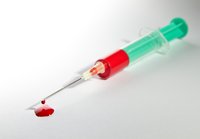- Education
-
Research
Current research
Talent
-
Collaboration
Businesses
Government agencies and institutions
Alumni
-
About AU
Organisation
Job at AU
What is your body’s biological age? There are different answers according to which body age test you take. However, researchers have now shown that it is possible to accurately account for the body’s biological age by means of a blood test. The research results will have important consequences – not only for the health of the individual, but also for the economy of the society.
2014.02.14 |

There is no one single good marker for ageing. Grey hair and wrinkles are often regarded as typical signs of ageing, but they are not good markers. Some people get grey hair as early as their twenties, and a fisherman on the west coast of Denmark typically has more wrinkles that others due to exposure to the sun and the wind. This is why the researchers in the Mark-Age Project are studying ageing markers in the blood.
According to your birth certificate, you are forty years old, but your body could actually be more like sixty – or possibly just twenty years old. To learn about the biological age of their bodies, people have until now been referred to a number of more or less unreliable body age tests at places such as fitness centres. However, researchers have now succeeded in developing a more accurate method.
The Mark-Age Project – with the participation of Aarhus University researchers – is a major European Commission initiative based on more than 4000 blood tests from different individuals in Europe. The project has analysed a considerable number of biological age markers in the blood. “We’ve identified fifty to seventy age markers in the blood,” explains Associate Professor Peter Kristensen. “These include different proteins and – when combined – they can account for the biological age of the body. There’s considerable biological variation when you measure one single marker, but when you measure fifty to seventy markers, this biological variation is evened out. In terms of pure statistics, you thereby get a more accurate impression of the biological age,” he continues.
The project still needs to be implemented in practice, but the future prospects are that everyone will be able to have a blood test taken by their general practitioners, and find out their biological age this way.
The way to healthy ageing
When the doctor knows your biological age, it makes it possible for you to have a better life with fewer illnesses in your old age. If you are fifty years old with the biological age of an eighty-year-old, your doctor can actually initiate preventive treatment against a number of age-related conditions.
“It’s basically all about being at the forefront and thus creating the best conditions for healthy ageing,” says Associate Professor Kristensen.
The biological age score can also provide information about societal development. Health system expenses are expected to increase in the future because there will be more and more elderly people in the community. But is that actually true?
“According to their birth certificates, people will certainly grow older, but they will also get healthier and healthier. If the biological age decreases, expenses for institutions such as old people’s homes won’t increase,” he says.
Cancer or old age
Knowledge of the body’s biological age will have great significance for the health of the individual. One of the biological markers studied by the researchers is the protein PSA (prostate-associated antigen), which is found in the blood of men.
The amount of this protein in the blood can reveal whether the man is at risk of developing prostate cancer. The problem is just that the amount of PSA increases with age, and an elevated level of PSA does not necessarily mean that the individual has cancer.
“If you’re a fifty-year-old and your doctor measures your PSA level and says it’s too high, it doesn’t have to be because you’re about to get prostate cancer. It could also just be that your biological age is not fifty, but is eighty years. If your doctor knows your biological age, there is a much better basis for assessing whether or not you are in a risk group for getting prostate cancer,” says Associate Professor Kristensen.
Read more about the Mark-Age Project